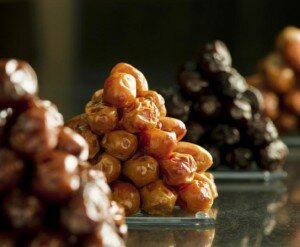-
The Islamic tradition of dates in Ramadan, and its new modern twists
Look at any table that is being laid in advance of iftar, and one staple item wherever you are in the world in Ramadan is a box of dates. According to Islamic tradition, it is highly recommended to break your fast with dates. It is said that the Prophet Muhammad used to love dates and that he always broke his fast with a date. High in sugars that are easy to absorb into the blood stream, it’s a great kick start to the body after a long day of fasting, and tasty and succulent to boot.
The Quran mentions dates and date palms at least 20 times. One description is about how Mary the mother of Jesus (known in Arabic as Maryam) after giving birth to her baby, ate dates to restore her energy.
Muslims will often gift boxes of dates before and during Ramadan in particular, and quality is not to be sacrificed!
Packaging and presenting dates of good quality, and getting them to the right consumers is a huge market. One example is a company in Malaysia that sells dates using traditional designs to enhance its packaging, in this case a ‘songket’ motif. This is based on traditional gold and silver thread patterned fabrics usually used for weddings and gifts. The company’s indirect promotion of traditional Malay heritage is seen as part of its corporate social responsibility. They also believe in purity, and avoidance of contamination from a hygiene or halal perspective when it comes to additives. They adhere to the ‘halal’ and ‘tayyib’ (wholesome) conditions for food for Muslim consumers. Last year they sold dates worth around $800k, and most of their products go to corporate customers or government bodies. They also sell to all local hypermarkets, and are making headway into China and Russia.
Some dates have inherent brand recognition, such as the Ajwa date, which comes from Medina in Saudi Arabia, and is said to have been the Prophet’s favourite date.
With such Islamic emphasis on the goodness of dates both physically and spiritually, sales of dates are high, and there are increasing variations in how they are consumed. At this time, there are no clear figures on any jump in sales of dates, because they hail from so many places around the world. However, shops find demand is high in both quantity and variety. Imports and prices rise dramatically.
There are traditional variations in date consumption such as date juices, syrups, date bakhlavas and halvas, as well as dates in savoury dishes like tagines.
However, there are modern twists on the use of dates, as well as new brands being established.
Bateel is a luxury date brand which includes ingredients like sweet lemon, pineapple peel, almonds and marzipan as well as options like being dipped in Belgian Chocolate, having date cookies or even non-alcoholic date champagne. It’s extending its brand to a cafe concept as well.
In 2007, Starbucks introduced a special Ramadan Date Frappuccino just for the holy month which combined date juice, with their coffee, blended with milk and ice and topped with cream and date drizzle. They then created a line of pastries that would complement the new drink. It was designed for the Middle East market, but it made it’s way over to the USA as well.
Dates are thoroughly ingrained into Islamic tradition, and will continue to play a significant religious and cultural role. What will be interesting to watch is whether these burgeoning brands and product ideas will expand. What they will need to do for the Muslim futurists is to connect their status as highly prized foods from a religious perspective, with their aspiration for quality, brand and presentation.


